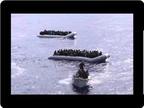22 may 2014
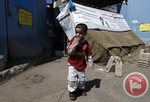
A group of 30 Palestinian refugees fleeing Syria have been allowed to temporarily enter Tunisia until a permanent solution can be found, having been denied entry to the country a day earlier.
The refugees landed in Tunis–Carthage International Airport on Wednesday after having fled Syria via Beirut. Tunisian authorities initially denied them entry to the country and they were forced to stay in the airport.
On Thursday, one of the refugees told Ma'an that Tunisian authorities had decided to grant 30-day visas to the group so they can enter the country while trying to find a permanent solution.
The Tunisian Ministry of Interior said Thursday that they issued the visas after the Palestinian ambassador to the country intervened.
Women and children will be provided with temporary accommodation while male refugees will stay at the passengers hall in the airport, a statement said.
PA ambassador Salman al-Hirafi said that it was up to Tunisian authorities whether the refugees would be returned to Beirut or go to Libya.
Tunisian Minister of Tourism Amel Karboul wrote on her Facebook page that the ministry of tourism "offers to host the Palestinian brothers who were denied entry to Tunisia Wednesday, at the expense of the Tunisian state."
In February, the Turkish government agreed to grant residency permits to Palestinians who had fled Syria for Turkey.
Approximately 250,000 Palestinian refugees have been forced to leave their refugee camps in Syria due to violence in the country.
Prior to the conflict, 600,000 Palestinian refugees lived in Syria.
Palestinian refugees stuck in Carthage Airport declare hunger strike
Palestinian refugees fleeing from Syria, stuck in Carthage International Airport in Tunisia, declared hunger strike after being threatened to be deported to Lebanon, and condemned the Palestinian ambassador's position in Tunisia. The stranded refugees charged Palestinian ambassador in Tunisia of not bearing his responsibilities and duties.
For its part, Action Group for Palestinian Refugees in Syria confirmed that the refugees declared hunger strike after the Palestinian ambassador failed to solve their issue and refused to allow their entry to Tunisian territories.
The 30 refugees called on human rights institutions to intervene immediately to stop their deportation to Lebanon.
The refugees declared their intention to file a petition with the Tunisian Interior Ministry asking for allowing their access to the Tunisian territories on their own.
In the petition, the refugees vowed not to cause any problems in Tunisia till their travel to Libya.
In its official Facebook page, Tunisian Interior Ministry declared its decision to grant Palestinian refugees visas allowing them to stay in Tunisia at the expense of Tunisian authorities.
The ministry also allowed human rights organizations to visit the refugees and check on their health conditions; however the refugees refused to enter Tunisian territories willing to travel to another state.
Interior Ministry pointed to the ongoing coordination with Palestinian embassy in Tunisia in order to solve their issue.
In their turn, the stranded refugees confirmed that they did not refuse any offer to enter Tunisian territories, holding the Palestinian ambassador responsibility for rejecting the ministry's offer.
30 Palestinian asylum-seekers are still stranded at Carthage Airport after their plane was forced to land in the International Carthage Airport due to the upheavals in the Libyan territories.
Meanwhile, four Palestinian refugees are still detained in Wardia police station 4 months ago.
Palestinian refugees' case has attracted a great deal of attention among Tunisian media outlets and human rights organizations which called for allowing their immediate entry to Tunisian territories.
Dozens of Tunisians have protested on Wednesday at Carthage international airport against the detention of the Palestinians for more than five days at the airport, according to Anatolia news agency.
Palestinian refugees, stuck in Carthage airport, told Quds Press that Tunisian authorities plan to deport them to Lebanon on Wednesday.
“If Tunisian authorities refuse to accept us as tourists as they did with the Israelis, they have at least to allow us to stay in the airport till the end of Libya's security problems”, they said, warning of the serious risks they can face in Lebanon.
A number of Tunisian MPs and civil society activists expressed their absolute sympathy with the Palestinian refugees' case.
For his part, Tunisian human rights activist Salah al-Din Jourchi told Quds Press that contacts and efforts have been made to solve the refugees' crisis especially that article 25 of Tunisian constitution allows the asylum-seekers' entry to Tunisia.
Tunisian authorities have deported early this month a group of Palestinian refugees to Turkey after refusing their access to Tunisia, while another group of Palestinian refugees are still detained in Wardia police station.
A group of human rights activists in Tunisia, Syria, and Palestine confirmed that Tunisian authorities have deported Palestinian refugees fleeing from Syria's ongoing bloody events more than once in violation of Article 25 in Tunisian constitution.
In early May, 15 Palestinian refugees were deported by Tunisian authorities to Lebanon, where some of them were arrested by Lebanese forces, the group added.
Tunisian authorities have also deported 4 Syrian refugees to Turkey, and continued the detention of 4 Palestinian refugees in Wardia police station amid very poor detention conditions after being arrested on April 9 for trying to enter Libya illegally.
The 4 Palestinian refugees are threatened with deportation to Turkey.
The 30 Palestinian refugees, stuck in Carthage airport, include three children and three women in addition to an elderly woman and Palestinian youths wanted by Syrian regime.
The refugees have reached Tunisia in two groups on the 15th and 16th of May holding legal Libyan visas, where they were scheduled to travel to Libya; however Benghazi airport was closed for security reasons.
The human rights group called on the Tunisian government to backtrack on its decision to deport the Palestinian refugees fleeing from Syria and to abide by international conventions related to asylum seekers' rights.
The refugees landed in Tunis–Carthage International Airport on Wednesday after having fled Syria via Beirut. Tunisian authorities initially denied them entry to the country and they were forced to stay in the airport.
On Thursday, one of the refugees told Ma'an that Tunisian authorities had decided to grant 30-day visas to the group so they can enter the country while trying to find a permanent solution.
The Tunisian Ministry of Interior said Thursday that they issued the visas after the Palestinian ambassador to the country intervened.
Women and children will be provided with temporary accommodation while male refugees will stay at the passengers hall in the airport, a statement said.
PA ambassador Salman al-Hirafi said that it was up to Tunisian authorities whether the refugees would be returned to Beirut or go to Libya.
Tunisian Minister of Tourism Amel Karboul wrote on her Facebook page that the ministry of tourism "offers to host the Palestinian brothers who were denied entry to Tunisia Wednesday, at the expense of the Tunisian state."
In February, the Turkish government agreed to grant residency permits to Palestinians who had fled Syria for Turkey.
Approximately 250,000 Palestinian refugees have been forced to leave their refugee camps in Syria due to violence in the country.
Prior to the conflict, 600,000 Palestinian refugees lived in Syria.
Palestinian refugees stuck in Carthage Airport declare hunger strike
Palestinian refugees fleeing from Syria, stuck in Carthage International Airport in Tunisia, declared hunger strike after being threatened to be deported to Lebanon, and condemned the Palestinian ambassador's position in Tunisia. The stranded refugees charged Palestinian ambassador in Tunisia of not bearing his responsibilities and duties.
For its part, Action Group for Palestinian Refugees in Syria confirmed that the refugees declared hunger strike after the Palestinian ambassador failed to solve their issue and refused to allow their entry to Tunisian territories.
The 30 refugees called on human rights institutions to intervene immediately to stop their deportation to Lebanon.
The refugees declared their intention to file a petition with the Tunisian Interior Ministry asking for allowing their access to the Tunisian territories on their own.
In the petition, the refugees vowed not to cause any problems in Tunisia till their travel to Libya.
In its official Facebook page, Tunisian Interior Ministry declared its decision to grant Palestinian refugees visas allowing them to stay in Tunisia at the expense of Tunisian authorities.
The ministry also allowed human rights organizations to visit the refugees and check on their health conditions; however the refugees refused to enter Tunisian territories willing to travel to another state.
Interior Ministry pointed to the ongoing coordination with Palestinian embassy in Tunisia in order to solve their issue.
In their turn, the stranded refugees confirmed that they did not refuse any offer to enter Tunisian territories, holding the Palestinian ambassador responsibility for rejecting the ministry's offer.
30 Palestinian asylum-seekers are still stranded at Carthage Airport after their plane was forced to land in the International Carthage Airport due to the upheavals in the Libyan territories.
Meanwhile, four Palestinian refugees are still detained in Wardia police station 4 months ago.
Palestinian refugees' case has attracted a great deal of attention among Tunisian media outlets and human rights organizations which called for allowing their immediate entry to Tunisian territories.
Dozens of Tunisians have protested on Wednesday at Carthage international airport against the detention of the Palestinians for more than five days at the airport, according to Anatolia news agency.
Palestinian refugees, stuck in Carthage airport, told Quds Press that Tunisian authorities plan to deport them to Lebanon on Wednesday.
“If Tunisian authorities refuse to accept us as tourists as they did with the Israelis, they have at least to allow us to stay in the airport till the end of Libya's security problems”, they said, warning of the serious risks they can face in Lebanon.
A number of Tunisian MPs and civil society activists expressed their absolute sympathy with the Palestinian refugees' case.
For his part, Tunisian human rights activist Salah al-Din Jourchi told Quds Press that contacts and efforts have been made to solve the refugees' crisis especially that article 25 of Tunisian constitution allows the asylum-seekers' entry to Tunisia.
Tunisian authorities have deported early this month a group of Palestinian refugees to Turkey after refusing their access to Tunisia, while another group of Palestinian refugees are still detained in Wardia police station.
A group of human rights activists in Tunisia, Syria, and Palestine confirmed that Tunisian authorities have deported Palestinian refugees fleeing from Syria's ongoing bloody events more than once in violation of Article 25 in Tunisian constitution.
In early May, 15 Palestinian refugees were deported by Tunisian authorities to Lebanon, where some of them were arrested by Lebanese forces, the group added.
Tunisian authorities have also deported 4 Syrian refugees to Turkey, and continued the detention of 4 Palestinian refugees in Wardia police station amid very poor detention conditions after being arrested on April 9 for trying to enter Libya illegally.
The 4 Palestinian refugees are threatened with deportation to Turkey.
The 30 Palestinian refugees, stuck in Carthage airport, include three children and three women in addition to an elderly woman and Palestinian youths wanted by Syrian regime.
The refugees have reached Tunisia in two groups on the 15th and 16th of May holding legal Libyan visas, where they were scheduled to travel to Libya; however Benghazi airport was closed for security reasons.
The human rights group called on the Tunisian government to backtrack on its decision to deport the Palestinian refugees fleeing from Syria and to abide by international conventions related to asylum seekers' rights.

A Palestinian refugee was killed on Tuesday following violent clashes between the Syrian regime forces and the free army in Deraa, south of Syria, while limited quantities of food-aid parcels were distributed in the besieged Yarmouk camp. The Action Group for Palestinians in Syria identified the martyr as Sayed Gharabla, a Deraa refugee.
In another event, limited food-aid quantities were distributed at the Yarmouk camp for Palestinian refugees in Damascus, blockaded for more than 11 months, on Wednesday.
Lack of medical care has been on the rise as all of the hospitals and clinics closed due to shortages in medical supplies and the siege.
The medical staff at Palestine Hospital at the Yarmouk refugee camp is working under extremely arduous circumstances due to power outages for more than one year and shortage in the medical crew.
In a related context, Khan al-Sheeh refugee camp in Damascene suburbs has been through a similar state of affairs due to the frequent blockage in the mediating roads between the camp and the city center and the heavy shelling targeting adjacent areas.
Khan al-Sheeh has also been subject to severe medical crises as nearby hospitals have been suspended.
Khan Danoun refugee camp in Damascus has been suffering due the lack of basic services, particularly potable water.
In another event, limited food-aid quantities were distributed at the Yarmouk camp for Palestinian refugees in Damascus, blockaded for more than 11 months, on Wednesday.
Lack of medical care has been on the rise as all of the hospitals and clinics closed due to shortages in medical supplies and the siege.
The medical staff at Palestine Hospital at the Yarmouk refugee camp is working under extremely arduous circumstances due to power outages for more than one year and shortage in the medical crew.
In a related context, Khan al-Sheeh refugee camp in Damascene suburbs has been through a similar state of affairs due to the frequent blockage in the mediating roads between the camp and the city center and the heavy shelling targeting adjacent areas.
Khan al-Sheeh has also been subject to severe medical crises as nearby hospitals have been suspended.
Khan Danoun refugee camp in Damascus has been suffering due the lack of basic services, particularly potable water.
21 may 2014
The Action Group further called on the Tunisian mass-media and human rights organizations to address such a humanitarian affair and halt the serious breaches of international laws carried out against Palestinian refugees.
Deportation dates of a 30-refugee-batch, scheduled for Tuesday evening, from Tunisia have been called off until further notice while solidarity moves are still going on to alleviate the refugees’ agony.
The Palestinian refugees landed in Tunisia while they were on their way to Libya. The plane had to land in the International Carthage Airport due to the upheavals in the Libyan territories.
Along the same line, the female refugees were carried to a nearby hotel following a visit paid by the Palestinian ambassador in Tunisia to the arrested refugees.
In a related context, limited food-aid parcels were distributed in the besieged Yarmouk refugee camp, that had already run out of food and medical supplies due the siege imposed by the Syrian regime army and popular front – general command groups for more than 11 months.
Death toll of Palestinian Yarmouk refugees has gone up to 147.
Deportation dates of a 30-refugee-batch, scheduled for Tuesday evening, from Tunisia have been called off until further notice while solidarity moves are still going on to alleviate the refugees’ agony.
The Palestinian refugees landed in Tunisia while they were on their way to Libya. The plane had to land in the International Carthage Airport due to the upheavals in the Libyan territories.
Along the same line, the female refugees were carried to a nearby hotel following a visit paid by the Palestinian ambassador in Tunisia to the arrested refugees.
In a related context, limited food-aid parcels were distributed in the besieged Yarmouk refugee camp, that had already run out of food and medical supplies due the siege imposed by the Syrian regime army and popular front – general command groups for more than 11 months.
Death toll of Palestinian Yarmouk refugees has gone up to 147.
20 may 2014
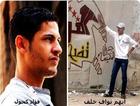
Fouad Kahoul and Ayham Khalaf
The death toll of Palestinian refugees killed in Syria during this week has gone up to 12, due the ceaseless shelling, violence, torture, and the siege targeting Palestinian refugee camps. Meanwhile, dozens of displaced Palestinians have been denied asylum in Tunisia and Lebanon.
The Action Group for Palestinians in Syria said in a statement Fouad Kahoul and Ayham Khalaf were killed on Sunday due to the heavy shelling and violent confrontations targeting the Deraa refugee camp south of Syria.
Yarmouk camp for Palestinian refugees in Damascus had been subject to heavy shelling on Sunday afternoon, which led to serious material damages.
Meanwhile regime army forces and Popular Front – General Command groups allowed limited aid-access into the camp, besieged for more than 11 months.
In another event, heavy bomb-blasts rocked Khan al-Sheeh camp for Palestinian refugees in Reef Damascus following explosions of barrel bombs and artillery shells in adjacent areas. A state of panic overwhelmed the refugees.
According to the Action Group, the death toll of Palestinian refugees has gone up to 12 during this week.
Mohamad Ahmad Badr died under torture in Syrian prisons while three others were killed due to the heavy shelling.
Two members of the Popular Front for the Liberation of Palestine – General Command were killed following violent clashes in the Yarmouk camp while another member was killed in Damascus.
Fatah Al-Intifada movement documented the death of four of its members due to clashes in Syria.
In a related context, the Action Group called on the Syrian authorities to provide details on the current state of affairs of hundreds of Palestinian detainees, who have been missing up to now.
What is going on inside of Syrian detention centers for Palestinian refugees is a war crime, in all possible senses of the term, the Action Group asserted.
In a related event, Tunisian authorities have been threatening 30 Palestinian refugees, including three woman, an 80-year-old elderly lady, and three children, with deportation to Lebanon, where their lives are seriously jeopardized.
The refugees’ appealed to the Tunisian government to grant them asylum in Tunisia either permanently or else until they can manage to gain access into the neighboring Libyan territories.
One of the refugees said in a telephone conversation with the Action Group: "The Tunisian authorities had given us a time-limit of a few days, until Tuesday morning, to return to Lebanon, under pretext that we have by-passed assigned residence deadlines.”
The refugees had arrived in Tunisia on May 15 aboard a legal flight from Rafik Hariri’s Airport towards Libya. But due to the latest upheavals in Benghazi, the plane landed in the Tunisian Carthage airport until the flight resumes.
“We appealed to the Tunisian authorities not to force us back to Lebanon, where we might be expelled and deported back to Syria. But our plea was turned down,” another refugee maintained.
49 Palestinian refugees from Syria were banned access into the Lebanese territories on May 4 under pretext of untrustworthy travel permits.
The Action Group for Palestinians in Syria revealed concerns over the arbitrary deportation orders issued by the Tunisian authority, heaving already deported 12 Palestinian refugees earlier this month.
The death toll of Palestinian refugees killed in Syria during this week has gone up to 12, due the ceaseless shelling, violence, torture, and the siege targeting Palestinian refugee camps. Meanwhile, dozens of displaced Palestinians have been denied asylum in Tunisia and Lebanon.
The Action Group for Palestinians in Syria said in a statement Fouad Kahoul and Ayham Khalaf were killed on Sunday due to the heavy shelling and violent confrontations targeting the Deraa refugee camp south of Syria.
Yarmouk camp for Palestinian refugees in Damascus had been subject to heavy shelling on Sunday afternoon, which led to serious material damages.
Meanwhile regime army forces and Popular Front – General Command groups allowed limited aid-access into the camp, besieged for more than 11 months.
In another event, heavy bomb-blasts rocked Khan al-Sheeh camp for Palestinian refugees in Reef Damascus following explosions of barrel bombs and artillery shells in adjacent areas. A state of panic overwhelmed the refugees.
According to the Action Group, the death toll of Palestinian refugees has gone up to 12 during this week.
Mohamad Ahmad Badr died under torture in Syrian prisons while three others were killed due to the heavy shelling.
Two members of the Popular Front for the Liberation of Palestine – General Command were killed following violent clashes in the Yarmouk camp while another member was killed in Damascus.
Fatah Al-Intifada movement documented the death of four of its members due to clashes in Syria.
In a related context, the Action Group called on the Syrian authorities to provide details on the current state of affairs of hundreds of Palestinian detainees, who have been missing up to now.
What is going on inside of Syrian detention centers for Palestinian refugees is a war crime, in all possible senses of the term, the Action Group asserted.
In a related event, Tunisian authorities have been threatening 30 Palestinian refugees, including three woman, an 80-year-old elderly lady, and three children, with deportation to Lebanon, where their lives are seriously jeopardized.
The refugees’ appealed to the Tunisian government to grant them asylum in Tunisia either permanently or else until they can manage to gain access into the neighboring Libyan territories.
One of the refugees said in a telephone conversation with the Action Group: "The Tunisian authorities had given us a time-limit of a few days, until Tuesday morning, to return to Lebanon, under pretext that we have by-passed assigned residence deadlines.”
The refugees had arrived in Tunisia on May 15 aboard a legal flight from Rafik Hariri’s Airport towards Libya. But due to the latest upheavals in Benghazi, the plane landed in the Tunisian Carthage airport until the flight resumes.
“We appealed to the Tunisian authorities not to force us back to Lebanon, where we might be expelled and deported back to Syria. But our plea was turned down,” another refugee maintained.
49 Palestinian refugees from Syria were banned access into the Lebanese territories on May 4 under pretext of untrustworthy travel permits.
The Action Group for Palestinians in Syria revealed concerns over the arbitrary deportation orders issued by the Tunisian authority, heaving already deported 12 Palestinian refugees earlier this month.
19 may 2014

A Palestinian refugee was killed Sunday morning under torture in the Syrian security prisons. Action group for Palestinian refugees in Syria said, young man Mustafa Mi’yari from al-Nairab refugee camp died after being tortured in the Syrian jails.
The group pointed out that he had been arrested for eight months.
It revealed that Der’a refugee camp was subject to a violent artillery shelling that targeted attacked areas of the camp and caused great damage to civilians’ houses.
It is noteworthy that military actions increased in the last few days in Der’a camp.
In al-Yarmouk refugee camp, humanitarian aids were allowed to enter the camp and distributed to the residents who are trapped in the camp for nearly 11 months.
The group pointed out that he had been arrested for eight months.
It revealed that Der’a refugee camp was subject to a violent artillery shelling that targeted attacked areas of the camp and caused great damage to civilians’ houses.
It is noteworthy that military actions increased in the last few days in Der’a camp.
In al-Yarmouk refugee camp, humanitarian aids were allowed to enter the camp and distributed to the residents who are trapped in the camp for nearly 11 months.
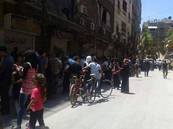
One hundred and twenty Palestinian children in Yarmuk were Sunday allowed out of the besieged refugee camp in southern Damascus to sit public exams, the UN agency for Palestinian refugees said. "UNRWA arranged for the (120) students temporarily to leave Yarmuk to enable them to participate in nationwide state exams for ninth graders," said the agency's spokesman Chris Gunness.
Once home to 150,000 Palestinians as well as Syrian residents, embattled Yarmuk has been under total army siege for the past year.
The camp is the scene of frequent violence despite a truce and its estimated 18,000 remaining residents also face dire food and medical shortages.
The students who temporarily left Yarmuk are being hosted at two government and UN-run facilities, and they have been provided with hygiene kits and a stipend, said Gunness.
"However, the situation the students left remains dire. There have been no UNRWA distribution of food parcels to civilians in Yarmuk since 13 May," he added.
In a Tweet, Gunness said: "Imagine being a 9th grader in Syria! Where must you think your future lies?"
According to the Syrian Observatory for Human Rights, food and medical shortages have killed more than 100 people in the camp.
Source: The Daily Star
Once home to 150,000 Palestinians as well as Syrian residents, embattled Yarmuk has been under total army siege for the past year.
The camp is the scene of frequent violence despite a truce and its estimated 18,000 remaining residents also face dire food and medical shortages.
The students who temporarily left Yarmuk are being hosted at two government and UN-run facilities, and they have been provided with hygiene kits and a stipend, said Gunness.
"However, the situation the students left remains dire. There have been no UNRWA distribution of food parcels to civilians in Yarmuk since 13 May," he added.
In a Tweet, Gunness said: "Imagine being a 9th grader in Syria! Where must you think your future lies?"
According to the Syrian Observatory for Human Rights, food and medical shortages have killed more than 100 people in the camp.
Source: The Daily Star
17 may 2014
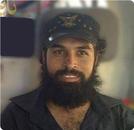
Mohammed Sersawi
Two Palestinian refugees were killed on Friday due to the continued siege and shelling on Palestinian refugee camps in Syria. Action Group for Palestinian Refugees in Syria confirmed on Saturday that Mohammed Sersawi and Abdul Rahman al-Masri, from Deraa refugee camp, were killed during shelling and clashes that erupted in Deraa city since the early Friday morning.
In the same context, Deraa camp has been subjected on Friday to heavy shelling coincided with a series of huge explosions in the neighboring villages.
Unprecedented military operations were carried out in the city amid heavy explosions, while warplanes continued hovering over the city.
Meanwhile, surrounding areas to Khan Shih refugee camp were subjected to aerial bombardment with explosive barrels, which led to a state of panic among the residents.
Two Palestinian refugees were killed on Friday due to the continued siege and shelling on Palestinian refugee camps in Syria. Action Group for Palestinian Refugees in Syria confirmed on Saturday that Mohammed Sersawi and Abdul Rahman al-Masri, from Deraa refugee camp, were killed during shelling and clashes that erupted in Deraa city since the early Friday morning.
In the same context, Deraa camp has been subjected on Friday to heavy shelling coincided with a series of huge explosions in the neighboring villages.
Unprecedented military operations were carried out in the city amid heavy explosions, while warplanes continued hovering over the city.
Meanwhile, surrounding areas to Khan Shih refugee camp were subjected to aerial bombardment with explosive barrels, which led to a state of panic among the residents.

Abdul Rahman al-Masri
On the other hand, Palestinian refugees organized a protest sit-in outside UNRWA headquarters in the Bekaa valley in Lebanon protesting against the recent Lebanese restrictions on entry of Palestinian refugees from Syria to the country.
The protesters called for providing them with appropriate shelter and improving their living conditions especially that 850 Palestinian and Syrian families, each containing 5 members, are currently living in the central and western Bekaa.
On the other hand, Palestinian refugees organized a protest sit-in outside UNRWA headquarters in the Bekaa valley in Lebanon protesting against the recent Lebanese restrictions on entry of Palestinian refugees from Syria to the country.
The protesters called for providing them with appropriate shelter and improving their living conditions especially that 850 Palestinian and Syrian families, each containing 5 members, are currently living in the central and western Bekaa.
15 may 2014
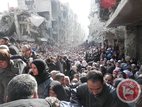
By Zena Ozeir
Zena Ozeir is a Palestine-solidarity activist based in Detroit. She was a main organizer of the Right of Return Conference that took place in Boston last year.
Today marks the 66th annual Nakba Day, the commemoration of the displacement of 750,000 Palestinians in 1948 amid the creation of the state of Israel. It is not merely a time for remembering the distant past, however, but instead it is a harsh reminder of the continued violence and displacement faced by Palestinian refugees.
Just this past weekend, the Lebanese government began deporting Palestinian refugees who had sought refuge in their country while fleeing the Syrian conflict. Lebanon's General Secretary Department has already deported at least 41 Palestinian refugees back to Syria even though they had legally entered the country, and has further banned the entry of Palestinian refugees fleeing Syria for the foreseeable future.
Lebanon has previously opened it's doors to over one million refugees fleeing the Syrian conflict, but is now targeting Palestinian refugees who wish to enter.
This policy is the newest onslaught by neighboring Arab countries on Palestinian refugees fleeing from Syria, who have been one of the most vulnerable groups caught in the violence plaguing the country. The ongoing targeted attacks by the Syrian government and refusal of entry by neighboring countries has left Palestinian refugees in Syria in an increasingly dangerous position.
This Nakba Day not only commemorates the initial catastrophe that ethnically cleansed 750,000 Palestinians, but also the second, and third displacement of the Palestinian refugees of Syria.
Since the start of the conflict, Palestinian refugee camps have been targeted by both sides, as rebel forces have infiltrated their midst and government forces have responded with indiscriminate shelling. As the Syrian conflict rages on with no end in sight, we see the increasing vulnerability faced by the refugees from numerous Syrian refugee camps.
The latest statistics show that more than 70 percent of Palestinian refugees in Syria are in need of humanitarian assistance and more than 50 percent are internally displaced.
The constant violence which has led to starvation and dire economic realities for Palestinian refugees is magnified by the exclusionary policies of neighboring states such as Jordan, Turkey and now, Lebanon. As early as April 2012, Jordanian authorities were denying entry to Palestinian refugees and more recently have adopted a policy of non-entry to all Palestinians fleeing Syria.
The newest discriminatory policy by the Lebanese authorities further comprises the largest and longest suffering group of refugees in the world today. Now doubly and triply displaced, Palestinians are subject to the most restricted movement not only in their homeland, but in neighboring countries where their refugee status keeps them from being able to flee to safety.
Commemorating the Nakba and fighting for the Right of Return for the more than seven million Palestinian refugees worldwide is more important now than ever as the position of these refugees is further compromised. We must look not only at the historical context of the day that is in remembrance, but also at the present situations that Palestinian refugees in historic Palestine, Syria, Lebanon, and Jordan find themselves, that of a constant and ongoing Nakba.
As the Right of Return has slowly been marginalized from the mainstream discourse, the Israeli government increasingly refuses to seriously consider the Right of Return in negotiations. It seems that the Right of Return has been relegated to the realm of the theoretical and abstract, and is being increasingly divorced from the political solution that Palestinian refugees are being allowed to envision.
But Palestinian refugees will continue to position themselves around the memory of their past and present displacement and insist upon their inalienable right to return to their homes in historic Palestine. Until Palestinians return to their homes, let us repeat, the Right of Return for all Palestinian refugees is nonnegotiable.
As Palestinian refugees from Syria are today caught in the crossfire, stateless, and without even the most basic human rights, the Right of Return must be put at the forefront now more than ever.
Palestinians in Syria today insist that they want to return to their country. Now it is time for Israel to cede to this demand.
Zena Ozeir is a Palestine-solidarity activist based in Detroit. She was a main organizer of the Right of Return Conference that took place in Boston last year.
Today marks the 66th annual Nakba Day, the commemoration of the displacement of 750,000 Palestinians in 1948 amid the creation of the state of Israel. It is not merely a time for remembering the distant past, however, but instead it is a harsh reminder of the continued violence and displacement faced by Palestinian refugees.
Just this past weekend, the Lebanese government began deporting Palestinian refugees who had sought refuge in their country while fleeing the Syrian conflict. Lebanon's General Secretary Department has already deported at least 41 Palestinian refugees back to Syria even though they had legally entered the country, and has further banned the entry of Palestinian refugees fleeing Syria for the foreseeable future.
Lebanon has previously opened it's doors to over one million refugees fleeing the Syrian conflict, but is now targeting Palestinian refugees who wish to enter.
This policy is the newest onslaught by neighboring Arab countries on Palestinian refugees fleeing from Syria, who have been one of the most vulnerable groups caught in the violence plaguing the country. The ongoing targeted attacks by the Syrian government and refusal of entry by neighboring countries has left Palestinian refugees in Syria in an increasingly dangerous position.
This Nakba Day not only commemorates the initial catastrophe that ethnically cleansed 750,000 Palestinians, but also the second, and third displacement of the Palestinian refugees of Syria.
Since the start of the conflict, Palestinian refugee camps have been targeted by both sides, as rebel forces have infiltrated their midst and government forces have responded with indiscriminate shelling. As the Syrian conflict rages on with no end in sight, we see the increasing vulnerability faced by the refugees from numerous Syrian refugee camps.
The latest statistics show that more than 70 percent of Palestinian refugees in Syria are in need of humanitarian assistance and more than 50 percent are internally displaced.
The constant violence which has led to starvation and dire economic realities for Palestinian refugees is magnified by the exclusionary policies of neighboring states such as Jordan, Turkey and now, Lebanon. As early as April 2012, Jordanian authorities were denying entry to Palestinian refugees and more recently have adopted a policy of non-entry to all Palestinians fleeing Syria.
The newest discriminatory policy by the Lebanese authorities further comprises the largest and longest suffering group of refugees in the world today. Now doubly and triply displaced, Palestinians are subject to the most restricted movement not only in their homeland, but in neighboring countries where their refugee status keeps them from being able to flee to safety.
Commemorating the Nakba and fighting for the Right of Return for the more than seven million Palestinian refugees worldwide is more important now than ever as the position of these refugees is further compromised. We must look not only at the historical context of the day that is in remembrance, but also at the present situations that Palestinian refugees in historic Palestine, Syria, Lebanon, and Jordan find themselves, that of a constant and ongoing Nakba.
As the Right of Return has slowly been marginalized from the mainstream discourse, the Israeli government increasingly refuses to seriously consider the Right of Return in negotiations. It seems that the Right of Return has been relegated to the realm of the theoretical and abstract, and is being increasingly divorced from the political solution that Palestinian refugees are being allowed to envision.
But Palestinian refugees will continue to position themselves around the memory of their past and present displacement and insist upon their inalienable right to return to their homes in historic Palestine. Until Palestinians return to their homes, let us repeat, the Right of Return for all Palestinian refugees is nonnegotiable.
As Palestinian refugees from Syria are today caught in the crossfire, stateless, and without even the most basic human rights, the Right of Return must be put at the forefront now more than ever.
Palestinians in Syria today insist that they want to return to their country. Now it is time for Israel to cede to this demand.
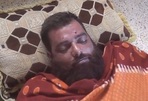
Abdul-Hadi Al-Hourani
One Palestinian refugee was killed on Wednesday in armed violence in Daraa refugee camp in Syria, according to the action group for the Palestinians in Syria. The action group stated that Abdul-Hadi Al-Hourani, a resident of Daraa camp, was killed when armed clashes broke out in the vicinity of the air force intelligence branch.
Violent clashes also broke out on Tuesday in Daraa refugee camp between Syrian regime forces and armed opposition groups.
In another context, commissioner-general of the UNRWA Pierre Krahenbuhl paid a visit to Al-Aideen refugee camp in Homs city to check on its humanitarian situation.
In Turkey, a border area in Kilis city saw the opening of a refugee center for the Palestinians fleeing the war in Syria.
The center, which can accommodates about 40 families, was established under the auspices of the interim Syrian government and will be administered by its general authority for the Palestinian refugees' affairs.
One Palestinian refugee was killed on Wednesday in armed violence in Daraa refugee camp in Syria, according to the action group for the Palestinians in Syria. The action group stated that Abdul-Hadi Al-Hourani, a resident of Daraa camp, was killed when armed clashes broke out in the vicinity of the air force intelligence branch.
Violent clashes also broke out on Tuesday in Daraa refugee camp between Syrian regime forces and armed opposition groups.
In another context, commissioner-general of the UNRWA Pierre Krahenbuhl paid a visit to Al-Aideen refugee camp in Homs city to check on its humanitarian situation.
In Turkey, a border area in Kilis city saw the opening of a refugee center for the Palestinians fleeing the war in Syria.
The center, which can accommodates about 40 families, was established under the auspices of the interim Syrian government and will be administered by its general authority for the Palestinian refugees' affairs.
14 may 2014
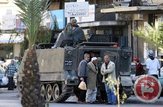
Seven Palestinians were injured on Monday in clashes between rival factions that broke out in the Ein al-Hilweh refugee camp in the southern Lebanese city of Sidon, Lebanese media reported.
NOW Lebanon said that supporters of Wahhabi militant group Fatah al-Islam opened fire on the office of Baathist group al-Saiqa as well as the Palestinian security forces' office in the camp, in apparent response for the death of a Fatah al-Islam member three days earlier.
NOW Lebanon said that supporters of Wahhabi militant group Fatah al-Islam opened fire on the office of Baathist group al-Saiqa as well as the Palestinian security forces' office in the camp, in apparent response for the death of a Fatah al-Islam member three days earlier.
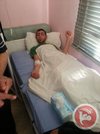
The slain member Alaa al-Din Ali Hojeir, was reported to have died on the Palestinian refugee camp's al-Fawqani street, where the clashes broke out on Wednesday.
The fighting escalated into clashes between the Bilal Badr Group and the Talal al-Ordoni Group, leading to the seven injuries.
During the clashes, 200 children were caught in the nearby Ghassan Kanafani kindergarten, but they were escorted out after after members of the UNRWA and the Palestinian Follow-up Committee worked with the Lebanese army to open up safe passage.
The fighting escalated into clashes between the Bilal Badr Group and the Talal al-Ordoni Group, leading to the seven injuries.
During the clashes, 200 children were caught in the nearby Ghassan Kanafani kindergarten, but they were escorted out after after members of the UNRWA and the Palestinian Follow-up Committee worked with the Lebanese army to open up safe passage.
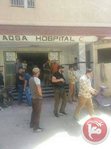
Following the clashes, residents took to the streets in protest, calling for a ceasefire and a return to security, NOW reported.
Ein al-Hilweh is a notoriously violent refugee camp in southern Lebanon, and clashes have escalated in recent years as groups in the camp have taken sides in the civil war in Syria and been provided access to both weapons and training with groups in the country.
Around 400,000 Palestinian refugees live across Lebanon, concentrated in camps that were set up after their descendants fled from their homes in what is now Israel in 1948, as part of the larger expulsion of around 750,000 Palestinians by Zionist groups as part of the effort to create a Jewish-majority state of Israel.
Ein al-Hilweh is a notoriously violent refugee camp in southern Lebanon, and clashes have escalated in recent years as groups in the camp have taken sides in the civil war in Syria and been provided access to both weapons and training with groups in the country.
Around 400,000 Palestinian refugees live across Lebanon, concentrated in camps that were set up after their descendants fled from their homes in what is now Israel in 1948, as part of the larger expulsion of around 750,000 Palestinians by Zionist groups as part of the effort to create a Jewish-majority state of Israel.
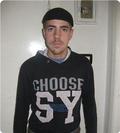
Mohamed Badr
Two Palestinian refugees were killed on Tuesday due to the continued siege, torture, and shelling targeting Palestinian refugee camps in Syria. The Action Group for Palestinians in Syria said in a statement on Wednesday that Palestinian youth Mohamed Badr was killed under torture in Syrian prisons after he was arrested on his way out of the Yarmouk camp a few months ago.
The Palestinian young man Fendi Ahmed died due to the shelling targeting the entrance to Damascene Juber suburb.
In a related context, violent confrontations erupted in the Yarmouk refugee camp Tuesday between Popular Front groups and Syrian armed militias around the camp. The clashes were followed by missile-firing while distributions of food-aid parcels have been blocked.
Living conditions in the Yarmouk camp for Palestinian refugees in Syria have become remarkably dire due to the tough siege imposed by Syrian regime forces and armed Popular Front groups for more than ten months, amid Palestinians’ calls and efforts to find a way out of the crisis.
Two Palestinian refugees were killed on Tuesday due to the continued siege, torture, and shelling targeting Palestinian refugee camps in Syria. The Action Group for Palestinians in Syria said in a statement on Wednesday that Palestinian youth Mohamed Badr was killed under torture in Syrian prisons after he was arrested on his way out of the Yarmouk camp a few months ago.
The Palestinian young man Fendi Ahmed died due to the shelling targeting the entrance to Damascene Juber suburb.
In a related context, violent confrontations erupted in the Yarmouk refugee camp Tuesday between Popular Front groups and Syrian armed militias around the camp. The clashes were followed by missile-firing while distributions of food-aid parcels have been blocked.
Living conditions in the Yarmouk camp for Palestinian refugees in Syria have become remarkably dire due to the tough siege imposed by Syrian regime forces and armed Popular Front groups for more than ten months, amid Palestinians’ calls and efforts to find a way out of the crisis.
